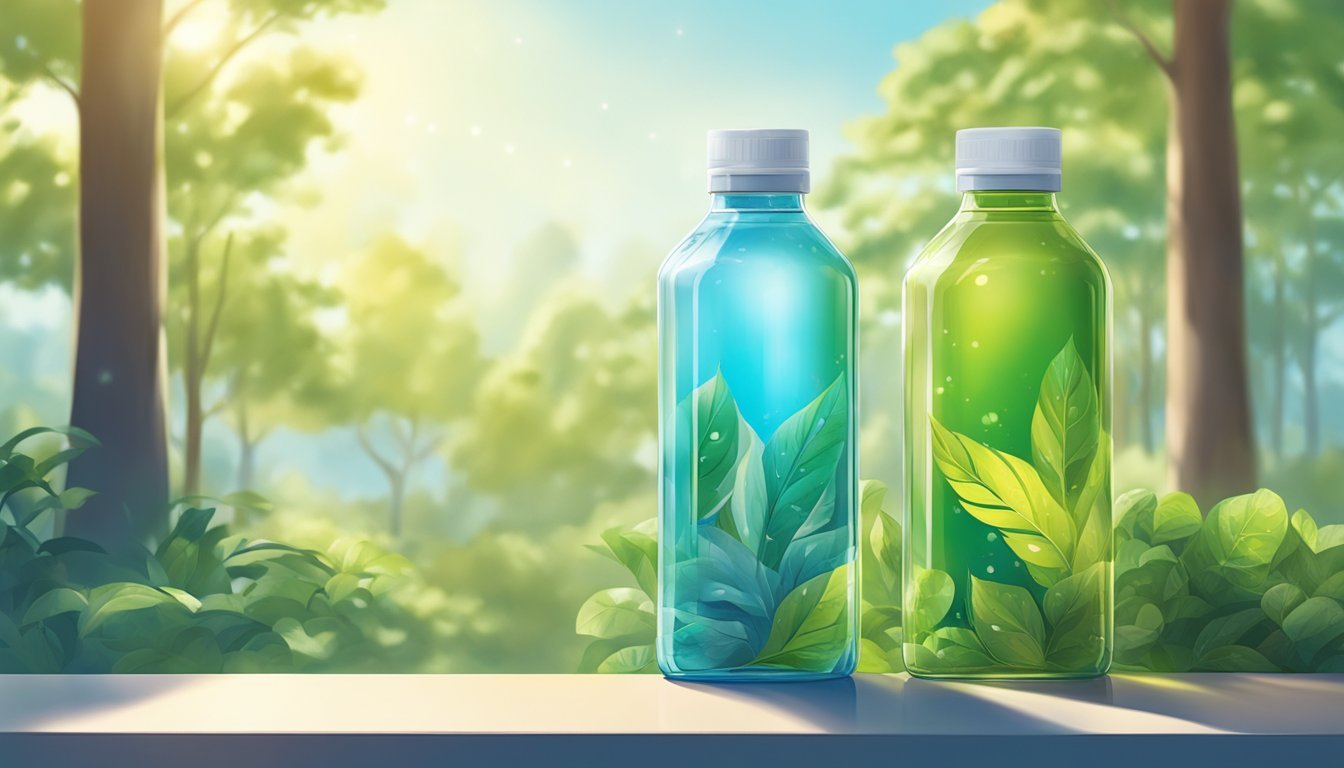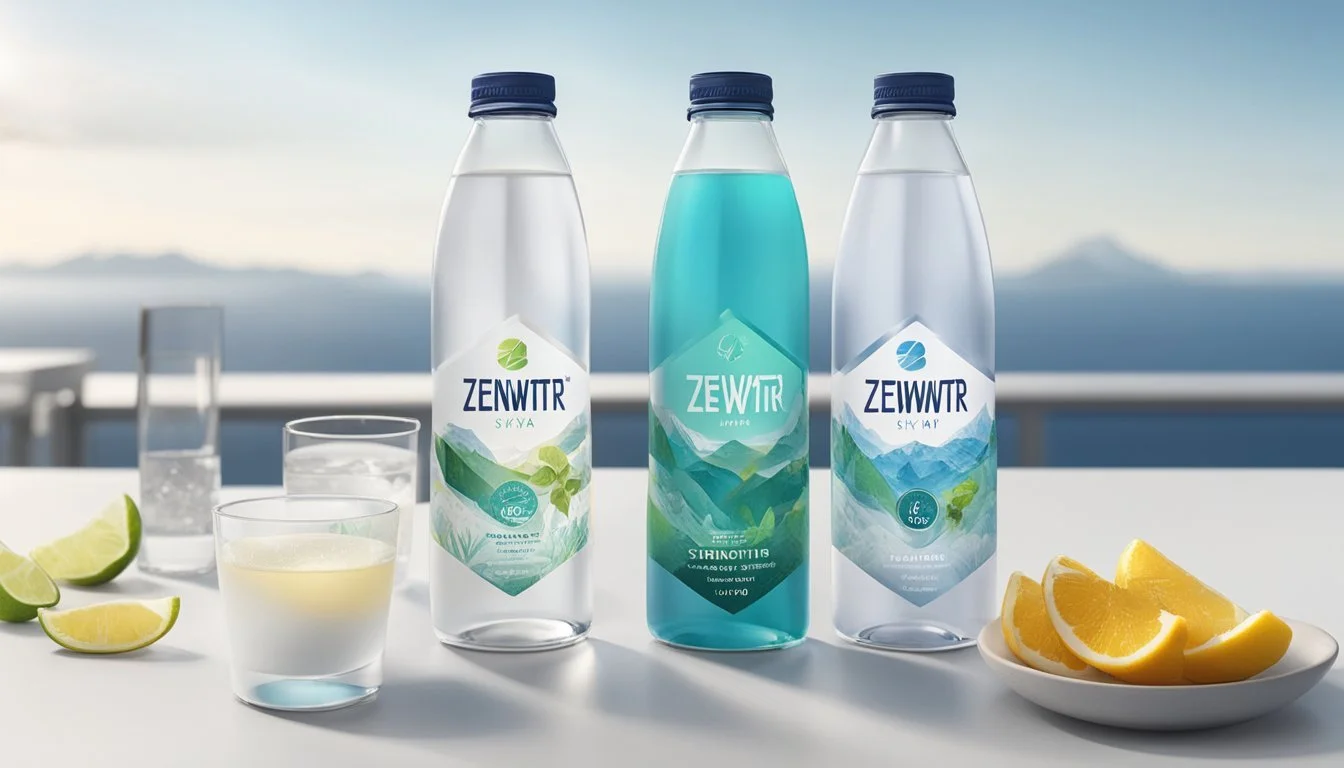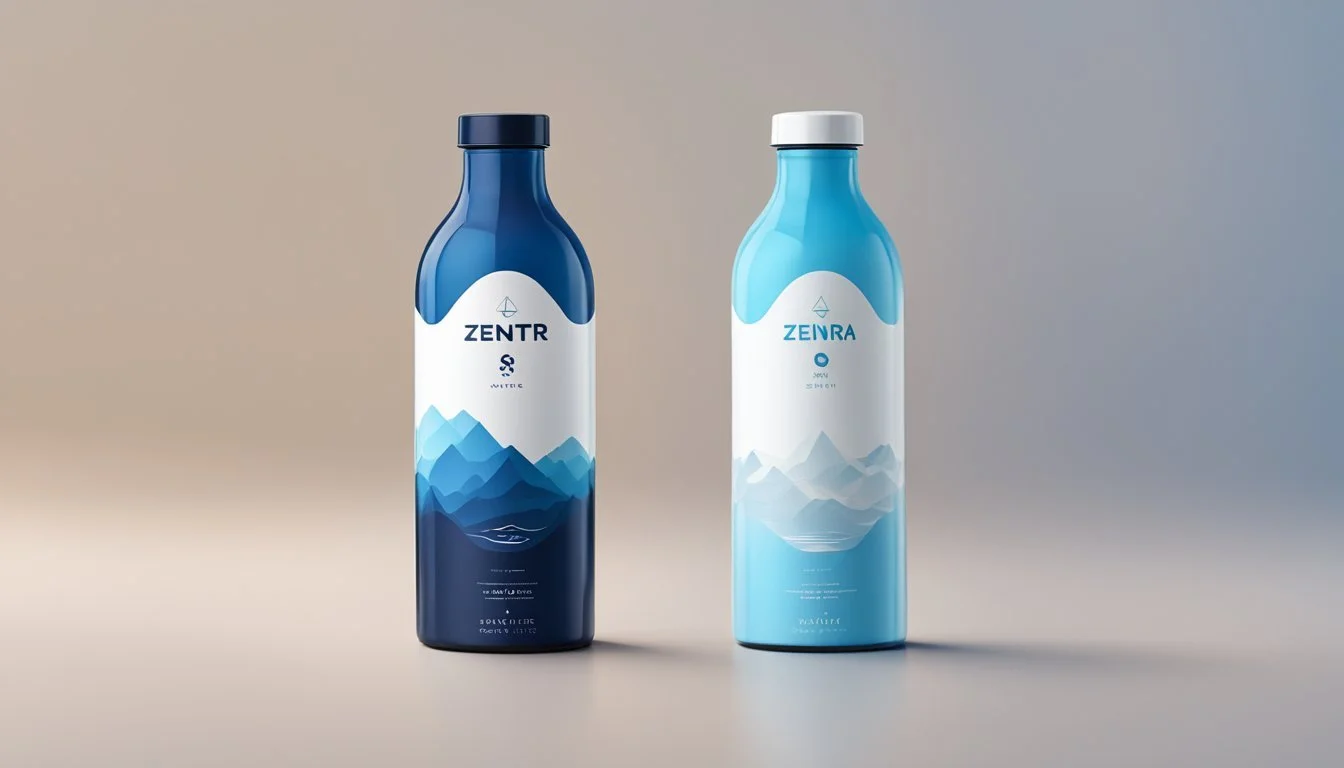Zenwtr vs. Skyra
A Detailed Bottled Water Comparison
Choosing the perfect bottled water can be a challenge, especially when deciding between two premium brands like ZenWTR and Skyra. Both offer unique features that make them stand out in the crowded market. ZenWTR prides itself on its 9.5 pH level, promoting natural alkalinity and environmental benefits through its eco-friendly packaging.
Skyra, on the other hand, is sourced from Icelandic springs, ensuring a crisp and pure taste. It highlights the pristine origins and minimalistic approach to water sourcing, appealing to those who prioritize natural sources. For those looking at environmental impact and natural alkalinity, ZenWTR may have the edge, whereas Skyra's pure taste benefits from its unique Icelandic source.
Readers interested in premium bottled water will find the comparison between ZenWTR and Skyra enlightening, as each brand brings a different value proposition to the table. Understanding these differences can help make an informed choice that aligns with personal preferences and priorities.
Understanding Bottled Water
Bottled water varies significantly in types, regulations, and how it compares to tap water. These differences can affect consumer choices, quality perceptions, and health benefits.
Types of Bottled Water
Bottled water comes in several types, including spring water, mineral water, purified water, alkaline water, and sparkling water.
Spring water originates from underground springs and is collected at the source.
Mineral water contains naturally occurring minerals and must adhere to specific concentrations.
Purified water undergoes processes such as distillation or reverse osmosis for contaminant removal.
Alkaline water aims to balance body pH and often has a higher pH level, above 7.
Sparkling water is carbonated, adding a fizzy texture. Each type offers unique benefits, such as mineral content or taste, catering to different consumer preferences.
Bottled Water Regulations
The FDA regulates bottled water in the United States under the Federal Food, Drug, and Cosmetic Act.
Labeling standards ensure accurate information about the source and contents.
For instance, labels must specify if the water is from a spring, treated, or altered.
EPA regulations for tap water serve as a benchmark, ensuring bottled water meets safety standards.
Companies must adhere to strict hygiene during production.
Mandatory testing includes microbial contaminants, ensuring consumer safety.
Non-compliance can result in penalties and recalls.
Bottled Water Vs. Tap Water
Tap water, regulated by the EPA, undergoes rigorous testing and must meet safety standards.
However, local water quality can vary based on infrastructure and treatment practices.
Bottled water, often viewed as a safer alternative, benefits from public perceptions of purity and convenience.
Brands promote attributes like mineral content or alkaline levels, appealing to health-conscious individuals.
Despite regulatory oversight, some bottled waters may not differ significantly from high-quality tap water.
Consumers often prefer bottled water for taste, convenience, or perceived quality, despite the environmental impact of plastic bottles.
In summary, understanding the nuances of bottled water helps consumers make informed choices regarding type, regulations, and their comparison to tap water.
Analyzing Zenwtr and Skyra
Zenwtr and Skyra are two premium bottled water brands known for their unique sourcing and health benefits. This section will provide an in-depth comparison of their company profiles, water sources and compositions, taste profiles, and health and hydration benefits.
Company Profiles
Zenwtr, launched with a mission to reduce plastic waste, uses bottles made from 100% recycled ocean-bound plastic. Their commitment to sustainability is a core value, appealing to eco-conscious consumers.
Skyra, on the other hand, sources its water from ancient, untouched glaciers in Iceland. The company emphasizes its natural origin, purity, and the pristine environment from which the water is sourced.
Source and Composition
Zenwtr sources its water from deep aquifers. It is naturally alkaline with a pH level of 9.5, providing a smooth and clean taste due to its higher mineral content. The water contains essential electrolytes such as calcium, magnesium, and potassium.
Skyra features water sourced from Icelandic glaciers, known for its purity and low mineral content. The water's pH level is naturally balanced at around 8.8, making it slightly less alkaline than Zenwtr. Skyra's low mineral concentration contributes to a fresh, crisp taste.
Taste Profile
Zenwtr's higher mineral content and alkalinity contribute to a silky smooth taste. This makes it a preferred choice for those who enjoy a fuller, richer water experience.
Skyra offers a clean and refreshing taste, attributed to its glacial source and minimalist mineral composition. Consumers who prefer a lighter and more neutral flavor often favor Skyra.
Health and Hydration Benefits
Zenwtr's alkaline nature and higher electrolyte content support effective hydration and may help balance the body's pH level. The presence of essential minerals like calcium and magnesium can aid in muscle function and overall health.
Skyra's primary health benefit lies in its purity and natural balance. Its lower mineral content means it's free from impurities, offering a refreshing choice for daily hydration. Both brands provide excellent hydration, but with slightly different health emphasis based on their mineral compositions.
Evaluating Water Quality and Purity
ZenWTR and Skyra are known for their purity and advanced filtration processes. This section takes a closer look at the methods they use and their measures to ensure safety and minimal contaminants.
Filtration and Purification Processes
ZenWTR utilizes a meticulous filtration process, emphasizing purity and high-quality standards. The water is sourced from a sustainable underground aquifer in the mountains and undergoes various filtration stages.
Skyra offers Icelandic spring water naturally filtered over the ages through basalt and lava. This method provides a natural filtration that retains beneficial minerals.
Filtration Method Comparison
Brand Filtration Process Key Features ZenWTR Multi-stage filtration Sustainable source, vigorous purification Skyra Basalt and lava natural filtration Retains natural minerals
Contaminant Levels and Safety Measures
ZenWTR is renowned for its naturally high pH of 9.5, indicating low acidity. Quality reports ensure the water is free from contaminants such as lead and harmful chemicals. The water maintains its alkalinity and purity without alterations.
Skyra, with a pH of 8.88, is known for its naturally clean composition. The self-replenishing source and daily bottling practices ensure freshness and safety. Tests from Skyra confirm the absence of contaminants, preserving purity and natural mineral content.
Key Safety Measures:
ZenWTR: Regular quality checks, high pH, contaminant-free
Skyra: Daily bottling, natural filtration, contaminant-free
Ensuring high purity standards, both brands employ rigorous processes to maintain safe and clean products for consumption.
Environmental Considerations
When choosing between ZenWTR and Skyra, it is crucial to evaluate their environmental impact through their sustainability initiatives, packaging materials, and the broader environmental consequences of bottled water.
Sustainability Initiatives
ZenWTR has distinguished itself in the sustainability arena by introducing bottles made from 100% recycled, ocean-bound plastic. This effort helps reduce marine pollution and conserves resources by reusing existing plastic waste.
Skyra, sourced from Iceland, emphasizes the pristine nature of its water source but has not matched ZenWTR's recycling achievements. ZenWTR also pledges to contribute a portion of its sales to ocean cleanup efforts, further cementing its eco-conscious stance.
Both brands aim to minimize their carbon footprint, but ZenWTR's comprehensive approach to sustainability marks it as a leader in the field.
Packaging and Materials
ZenWTR's commitment to environmental stewardship is evident in its use of 100% post-consumer recycled plastic for its bottles. This not only reduces the production of new plastic but also diverts waste that could otherwise end up in oceans.
Skyra primarily uses plastic bottles but has not highlighted significant innovations in material sustainability. In contrast, ZenWTR’s packaging choices reflect a clear commitment to using eco-friendly, sustainable packaging.
Neither brand has transitioned to glass bottles, which are often seen as more environmentally friendly due to their recyclability and lower long-term environmental impact.
Environmental Impact of Bottled Water
The bottled water industry is scrutinized for its environmental footprint, particularly concerning plastic waste and carbon emissions. ZenWTR's use of ocean-bound plastic helps mitigate some of the environmental damage caused by traditional plastic bottles.
However, bottled water production, including the sourcing, bottling, and transportation processes, contributes to carbon emissions. Skyra's Icelandic source may involve longer transportation routes, potentially increasing its carbon footprint.
Addressing these environmental challenges requires a multifaceted approach, including improved recycling rates, the adoption of sustainable packaging, and the reduction of carbon emissions through optimized logistics.
By integrating recycled materials and taking active steps towards sustainability, companies can significantly reduce their impact on the planet.
Comparative Analysis
This section explores the price comparison and consumer preference between ZenWTR and Skyra, focusing on key factors like cost, taste, and hydration benefits.
Price Comparison
ZenWTR positions itself as a premium bottled water, largely due to its sustainability efforts. It comes in eco-friendly packaging made from recycled ocean-bound plastic, which is a significant factor in its pricing. Skyra, sourced from Icelandic spring water, also places itself in the premium market but tends to be slightly more affordable than ZenWTR.
Price differences are generally not substantial, although ZenWTR may edge out Skyra in cost due to its environmental focus.
Brand Approximate Cost Packaging ZenWTR Higher Made from recycled ocean-bound plastic Skyra Moderate Standard premium bottled water packaging
Consumer Preference
Consumer preference often hinges on taste and potential health benefits. ZenWTR, known for its high pH level (9.5), appeals to those seeking alkaline water for hydration and athletic performance. It is particularly favored by athletes for its alkalinity and smooth taste.
Skyra emphasizes its natural filtration through Icelandic basalt and lava, which contributes to a crisp and clean taste. This appeals to consumers looking for water with a natural, unique mineral profile. Despite these differences, both brands have strong followings among water enthusiasts and are often recommended by water sommeliers for their high quality.
In terms of geographic preference, ZenWTR is more popular in markets focused on sustainability, while Skyra attracts those drawn to its Icelandic origins.
Expert Opinions and Reviews
Consumer reviews and expert opinions indicate that ZenWTR stands out for its natural alkalinity. Unlike brands like Essentia, which use artificial additives to achieve a high pH level, ZenWTR maintains a pH of 9.5 naturally.
Nutritionists favor ZenWTR for this reason, comparing it positively against other brands such as Core Hydration and Smartwater. The absence of artificial additives satisfies health-conscious consumers.
Environmental Impact
ZenWTR has garnered positive feedback for its environmental initiatives. Consumers appreciate that the brand uses 100% recycled packaging, aligning with efforts to reduce plastic pollution. This aspect often attracts eco-conscious buyers more than brands like Aquafina and Fiji.
Taste and Quality
Regarding taste, reviewers often mention that ZenWTR has a clean, crisp flavor. For instance, a TODAY ranking highlighted that its taste does not carry the plastic tang found in some bottled waters. This characteristic places it ahead of many Nestlé and Coca-Cola products.
Packaging and Convenience
ZenWTR bottles are praised for being sturdy and convenient. Comparatively, other brands like Evian and Fiji also offer robust packaging but may not focus as heavily on recycled materials.
Table: Expert Review Comparison
Brand Natural Alkalinity Recycled Packaging Consumer Taste Rating ZenWTR Yes Yes High Essentia No No Medium Smartwater No No Medium Core Yes No High
Experts and consumers alike recognize ZenWTR’s commitment to environmental sustainability and natural product quality. This positions it favorably against several competitors in the bottled water industry.
The International Bottled Water Association supports brands that meet high quality standards, underscoring the industry’s shift towards health and sustainability benchmarks, which ZenWTR embodies effectively.
More About Zenwtr
Mountain Valley Spring Water vs Zenwtr: Which Bottled Water is Better?
Richard's Rainwater vs Zenwtr: Which Bottled Water is Better?
Whole Foods Italian Still Mineral water vs Zenwtr: Which Bottled Water is Better?
Zenwtr vs Kirkland Signature: Which Bottled Water is Better?






